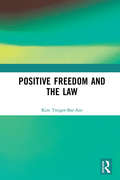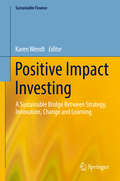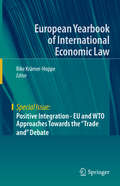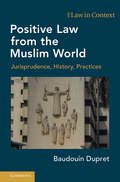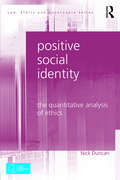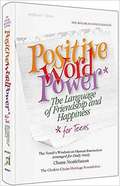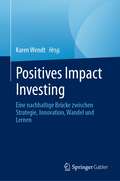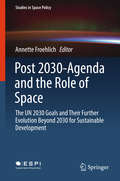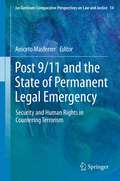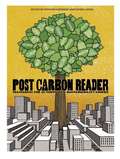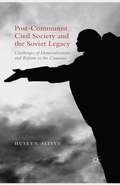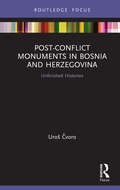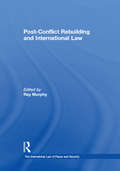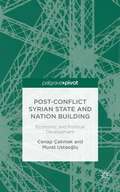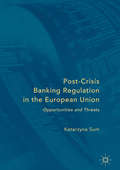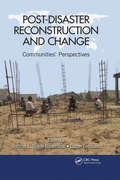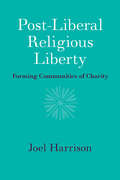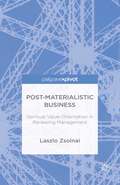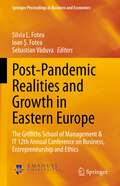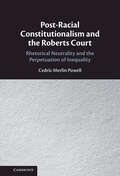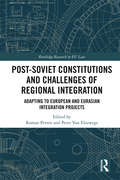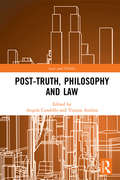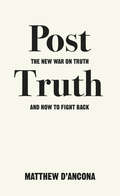- Table View
- List View
Positive Freedom and the Law: Dignity, Respect, and Expression
by Kim Treiger-Bar-AmThis book explains why we should stop thinking of freedom as limited to a right to be left alone. It explores how Kantian philosophy and Jewish thought instead give rise to a concept of positive freedom. At heart, freedom is inextricably linked to the obligation to respect the autonomy and dignity of others. Freedom thus requires relationships with others and provides an important source of meaning in liberal democratic societies. While individualism is said to foster detachment, positive freedom fosters relations. Moving from moral theory to law, duties are seen as intrinsic to rights. The book considers test cases involving the law of expression, regarding authorial rights and women's prayer at Jerusalem's holy site of the Western Wall. Affirmative duties of respect are essential. Rights held by copyright owners require that all authors – including so-called users – are shown respect. Moreover, rights held by the authorities at the Western Wall require that all worshippers – including those whose interpretation of Jewish law differs from that adopted by the authorities – are respected.
Positive Impact Investing: A Sustainable Bridge Between Strategy, Innovation, Change and Learning (Sustainable Finance)
by Karen WendtThis book illustrates the impact that a focus on environmental and social issues has on both de-risking assets and fostering innovation. Including impact as a new cornerstone of the investment triangle requires investors and clients to align interests and values and understand needs. This alignment process functions as a catalyst for transforming organizational culture within an organization and therefore initiates the external impact of the organization, but also its internal transformation, which in turn escalates the creation of impact. Describing how culture is the social glue permeating all disciplines of an organization, the book demonstrates how organizational alignment can be achieved in order to allow strategic speed, innovation and learning, and provides examples of how impact can be achieved and staff mobilized It particularly focuses on impact investing, impact entrepreneurship, innovation, de-risking asset, green investment solutions and investor movements to counteract climate change and implementing the United Nations Sustainable Development Goals, highlighting culture, communication, and strategy.
Positive Integration - EU and WTO Approaches Towards the "Trade and" Debate (European Yearbook of International Economic Law)
by Rike Krämer-HoppeThis book presents a new framework for the 'trade and environment' debate and discusses the ways in which the EU and the WTO address this topic: positive, negative and non-integration. It analyses areas like food safety and renewable energy from the perspectives of legal and political science, and economics, and includes contributions focusing on various approaches, such as harmonisation, regulatory cooperation and judicialisation. In the 21st century, especially in our current times, where free trade and economic integration are increasingly being called into question, it is even more vital to find convincing normative answers and ways to address the very complex relationship between trade and environmental policies. Debunking some of the myths concerning positive and negative integration and the relationship between the two, this book is a valuable contribution to the debate on globalisation.
Positive Law from the Muslim World: Jurisprudence, History, Practices (Law in Context)
by Baudouin DupretCan the concept of law be indiscriminately extended to times and places in which it did simply not exist? Such an extension is at best useless and at worst misleading. Producing an intelligible jurisprudence of the concept of law means keeping it within the reasonable boundaries of its contemporary common-sense understanding: positive law. Parallel to Western societies in which it firstly emerged, the concept of positive law developed in many places, including countries characterized as Muslim. There, it faced other existing normativities, like customs and the Sharia. This book aims, from the Muslim world's perspective, to clarify the uses of the concept of law and the ways of studying it, to describe some of its historical developments, including the ideas of constitutional law, customary law and forensic evidence, and to describe present-day practices, including reference to law sources, rules and interpretation.
Positive Social Identity: The Quantitative Analysis of Ethics (Law, Ethics and Governance)
by Nick DuncanDespite considerable work the answer to basic questions such as ‘what are our ethics and our moral norms now?’ ‘Have they changed since last year?’, ‘If so why?’ remain surprisingly illusive. This book argues that progress towards answering these questions is possible through a grounded analytical account of the cultivation of ethics and moral norms in social groups, in particular places and times. Departing from the evolutionary theory of why we gain value from pro-social behaviour, we argue that a coherent thread exists for how we do so through evolved social capacities that are united in the pursuit of a Positive Social Identity. Drawing on a unique quantitative dataset from Sierra Leone this book offers a theoretical framework and a preliminary guide to the systematic quantitative analysis of ethics and moral norms and how these may relate to the long term success of organisations. The results directly challenge a ‘one-size-fits-all’, universal understanding of both ethics and moral norms both within and between organisations. The costs and challenges influencing the development of ethics and moral norms and their ultimate conception of pro-sociality vary dramatically according to situation. Nowhere is this more starkly illustrated than between economically developed and developing countries. In analysing the relationship between agency and situation, the role of diversity, conflict, inefficiency and failure to cooperate prove to be essential components of the solution of social dilemmas on which Positive Social Identity depends.
Positive Word Power: The Language Of Friendship And Happiness: For Teens: The Torah Wisdom On Human Interaction Arranged For Daily Study
by Chana Nestlebaum Shaindy AppelbaumFriends, classmates, parents, siblings... they're what we cherish most in life. Now you can learn how to protect your greatest treasure from damage, keeping your relationships shining bright. It's all in the power of the words you speak. Learn the answers to such vital everyday questions as: Is a joke always funny? Is criticism always constructive? Does praise always build others up? How can I deal kindly with someone who annoys me? What if someone is not my type? How should I express anger? In 2009, The Chofetz Chaim Heritage Foundation produced Positive Word Power, based on "The Power of Words" by Rabbi Zelig Pliskin, which shone a bright light on the issue of ona'as devarim — hurting others with words. This daily learning sefer has been taken up by thousands of Jewish men and women who have learned how to recognize and change those thoughts and character traits that spur nice people to say hurtful things. Now The Chofetz Chaim Heritage Foundation brings these priceless lessons to you, teenage readers, through practical scenarios, strategies and discussion questions that reflect the unique challenges of your life. Positive Word Power for Teens will sensitize you to the impact of words you use and hear every day and help you shed negative habits. Through our words, each of us has the power to paint for ourselves a bright and loving world, or a dark and lonely one. With an investment of just a few minutes a day, you can learn how to choose the beautiful hues of kindness and sensitivity, and paint a world you'll be happy to live in today and for the rest of your life!
Positives Impact Investing: Eine nachhaltige Brücke zwischen Strategie, Innovation, Wandel und Lernen
by Karen WendtDieses Buch veranschaulicht die Auswirkungen, die eine Konzentration auf ökologische und soziale Themen sowohl auf die Risikominderung von Anlagen als auch auf die Förderung von Innovationen hat. Die Einbeziehung der Auswirkungen als neuer Eckpfeiler des Anlagedreiecks erfordert, dass Investoren und Kunden ihre Interessen und Werte aufeinander abstimmen und die Bedürfnisse verstehen. Dieser Abstimmungsprozess fungiert als Katalysator für die Veränderung der Organisationskultur innerhalb einer Organisation und initiiert somit die externe Wirkung der Organisation, aber auch ihre interne Veränderung, die wiederum die Schaffung von Wirkung verstärkt. Das Buch beschreibt, wie Kultur der soziale Klebstoff ist, der alle Disziplinen einer Organisation durchdringt, und zeigt auf, wie eine organisatorische Ausrichtung erreicht werden kann, um strategische Schnelligkeit, Innovation und Lernen zu ermöglichen, und liefert Beispiele dafür, wie Wirkung erzielt und Mitarbeiter mobilisiert werden können. Es konzentriert sich insbesondere auf Impact Investing, Impact Entrepreneurship, Innovation, De-Risking-Asset, grüne Investitionslösungen und Investorenbewegungen, um dem Klimawandel entgegenzuwirken und die Ziele für nachhaltige Entwicklung der Vereinten Nationen umzusetzen, und beleuchtet dabei Kultur, Kommunikation und Strategie.
Post 2030-Agenda and the Role of Space: The UN 2030 Goals and Their Further Evolution Beyond 2030 for Sustainable Development (Studies in Space Policy #17)
by Annette FroehlichThis book provides a deep insight to which extent further improvement should be envisaged to ensure and improve the sustainable development beyond 2030 (the Sustainable Development Goals is a set of 17 global goals with 169 associated targets which the state community adopted in 2015). As the world, its environment, economy and society is getting more and more technical advanced, it is of high interest to analyze how space and its various applications can support this development. Once the Goals of the “2030 Agenda for Sustainable Development” will be achieved new challenges are waiting. The analysis takes into account a proactive use of artificial intelligence for the development based on space infrastructure. Another important aspect revolves around the economic development which asks for further analysis of the cryptocurrencies relationship with space applications and how to use space based cryptocurrencies for development. Environment-wise the challenges for a sustainable development on Earth i.e. water supply, but also in outer space are requested ensuring a sustainable exploration and exploitation of space and its orbital resources. The book also highlights possible contributions of the post-2030 space industry to global economic development based on satellite technology and the enlargement of the scope of application of satellite data in administration and Justice to ensure development of effective, accountable and transparent institutions at all levels to promote growth, stability and security and peace on global level.
Post 9/11 and the State of Permanent Legal Emergency
by Aniceto MasferrerThe terrorist attacks occurred in the United States on 11 September 2001 have profoundly altered and reshaped the priorities of criminal justice systems around the world. Atrocities like the 9/11 attacks, the Madrid train bombings of March 2003, and the terrorist act to the United Kingdom of July 2005 threatened the life of democratic nations. The volume explores the response of democratic nation-states to the problems of terrorism and counter-terrorism within the framework of the Rule of Law. One of the primary subjects of study is the ways in which the interests of the state (security from external threats, the maintenance of civil peace, and the promotion of the commonwealth) are balanced or not with the liberty and freedom of the citizens of the state. The distinctive aspect of this focus is that it brings a historical, political, philosophical and comparative approach to the contemporary shape and purposes of the criminal justice systems around the world.
Post Carbon Reader: Managing the 21st Century's Sustainability Crises
by Richard Heinberg Daniel LerchHow do population, water, energy, food, and climate issues impact one another? What can we do to address one problem without making the others worse? The Post Carbon Reader features essays by some of the world's most provocative thinkers on the key issues shaping our new century, from renewable energy and urban agriculture to social justice and community resilience. This insightful collection takes a hard-nosed look at the interconnected threats of our global sustainability quandary and presents some of the most promising responses. Book jacket.
Post Pandemic Facilitation of Air Transport: LEGAL, POLITICAL AND ECONOMIC ASPECTS
by Ruwantissa AbeyratneFrom early 2020 for a period of two years at the end of which this book was written, air transport suffered unprecedented setbacks due to the COVID-19 pandemic. Although the pandemic may eventually fizzle out into another flu like occurrence, the restraint with which air transport services were offered would remain with us for a while with some practices being sustained, particularly those pertaining to public health. One of the main areas of air transport that was and will be affected significantly by the changed circumstances - is facilitation – a subject that is regulated by the Chicago Convention of 1944 and its Annex 9. This book looks in depth at the Annex as it will be applied in a post pandemic world, against its legal, socio-political, and economic impacts, addressing the Standards of the Annex on clearance of aircraft; entry and departure of passengers; and the carriage of cargo. It also discusses some critical aviation events in 2020 and 2021 that occurred as they relate to facilitation of air transport. Some of the key areas discussed are the role of ICAO; issues of public health as they relate to air transport; security of travel documents; smuggling of persons; digital technology and rights of the passenger; unruly passengers; carriage of disabled passengers; relief flights and repatriation flights; and facilities at airports.
Post-Communist Civil Society and the Soviet Legacy: Challenges of Democratisation and Reform in the Caucasus
by Huseyn AliyevThis book argues that the weakness of civil society in the post-Soviet Caucasus is a result not only of post-communist political and economic problems, but also of the effects of historical legacies. These influence both formal and informal civil societies and weaken the countries' ability to facilitate democratisation.
Post-Communist Transitional Justice
by Lavinia Stan Nadya NedelskyA close examination of an understudied European Union member state such as Romania reveals that, since 1989, post-Communist state and non-state actors have adopted a wide range of methods, processes and practices of working through the Communist past. Both the timing and the sequencing of these transitional justice methods prove to be significant in determining the efficacy of addressing and redressing the crimes of 1945 to 1989. In addition, there is evidence that some of these methods have directly facilitated the democratization process, while the absence of other methods has undermined the rule of law. This is the first volume to overview the complex Romanian transitional justice effort by accessing secret archives and investigating court trials of former Communist perpetrators, lustration, compensation and rehabilitation, property restitution, the truth commission, the rewriting of history books, and unofficial truth projects.
Post-Conflict Monuments in Bosnia and Herzegovina: Unfinished Histories (Routledge Focus on Art History and Visual Studies)
by Uroš ČvoroAt a time of dramatic struggles over monuments around the world, this book examines monuments that have been erected in post-conflict Bosnia and Herzegovina (BiH) since 1996. Examining the historical precedents for the high rate of monumentbuilding, and its links to ongoing political instability and national animosity, this book identifies the culture of remembrance in BiH as symptomatic of a broader shift: a monumentalisation and privatisation of history. It provides an argument for how to account for the politics of contemporary nation-state formation, control of space, trauma and revisions of history in a region that has been subject to prolonged instability and crisis. This book will be of interest to scholars in contemporary art, museum studies, war and conflict studies, and European studies.
Post-Conflict Rebuilding and International Law (The International Law of Peace and Security)
by Ray MurphyThis volume presents the research analysis of a range of scholars and experts on post conflict peacebuilding and international law from a variety of perspectives and missions. The selected essays show that peacebuilding, like the concept of peacekeeping, is not specifically provided for in the UN Charter. They also demonstrate that the record of peacebuilding, like that of peacekeeping, is varied and while both concepts are intrinsically linked, neither lends itself to precise definition. The essays consider the historical approaches to peacebuilding such as the role played by the UN in the Congo in the early 1960s and the work of the United States and its allies in rebuilding Germany and Japan in the aftermath of World War II. Finally, essays consider the major challenge for contemporary peacebuilding operations to make international administrations accountable and to ensure the involvement of the international community in helping rebuild communities and prevent the resurgence of violence.
Post-Conflict Syrian State and Nation Building: Economic and Political Development
by Cenap Çakmak Murat UstaoğluBased on extensive field work involving the leading figures of the diverse Syrian National Coalition, an umbrella initiative of opposition groups fighting against the Assad regime, this study critically evaluates the challenges ahead as well as the inherent opportunities for the post-conflict era in Syria.
Post-Crisis Banking Regulation in the European Union
by Katarzyna SumThis book offers holistic, economic analysis of the on-going regulatory reform in the European banking industry. The author addresses the main opportunities and pitfalls related to post-crisis financial regulation, and investigates whether the proposed solutions provide an appropriate response to the problems within the EU's ailing banking sector. The author gives particular focus to the implementation of Basel III, the introduction of the Banking Union, the inclusion of bank governance elements into regulatory frameworks, and the country-specific aspects of regulation at a national level. The discussion builds upon existing literature in the field and takes a novel approach in its examination of banking regulations, their endogeneity and their interactions with bank governance. The book also analyses banking regulation in the EU within theoretical frameworks, as well as by means of empirical exercises. Insights into the theory and practical aspects of banking regulation make this book a valuable read for academics, researchers, students and practitioners alike.
Post-Disaster Reconstruction and Change: Communities' Perspectives
by Jennifer E. Duyne Barenstein Esther LeemannSuccessful recovery following a disaster depends upon transcending the disciplinary divides of architecture, engineering, and planning and emphasizing the importance of community perspectives in the post-disaster reconstruction process. Effective results in community recovery mandate that we holistically examine the complex interrelationship betwee
Post-Liberal Religious Liberty: Forming Communities of Charity
by Joel HarrisonWhy should we care about religious liberty? Leading commentators, United Kingdom courts, and the European Court of Human Rights have de-emphasised the special importance of religious liberty. They frequently contend it falls within a more general concern for personal autonomy. In this liberal egalitarian account, religious liberty claims are often rejected when faced with competing individual interests – the neutral secular state must protect us against the liberty-constraining acts of religions. Joel Harrison challenges this account. He argues that it is rooted in a theologically derived narrative of secularisation: rather than being neutral, it rests on a specific construction of 'secular' and 'religious' spheres. This challenge makes space for an alternative theological, political, and legal vision. Drawing from Christian thought, from St Augustine to John Milbank, Harrison develops a post-liberal focus on association. Religious liberty, he argues, facilitates creating communities seeking solidarity, fraternity, and charity – goals that are central to our common good.
Post-Materialist Business: Spiritual Value-Orientation in Renewing Management
by László ZsolnaiPost-Materialist Business presents a spiritual-based approach to business and management. It uses pluralistic view of spirituality and provides a number of inspiring cases of alternative organizations which go beyond the materialistic mindset of business and serve the common good of society, nature, and future generations.
Post-Pandemic Realities and Growth in Eastern Europe: The Griffiths School of Management & IT 12th Annual Conference on Business, Entrepreneurship and Ethics (Springer Proceedings in Business and Economics)
by Sebastian Văduva Ioan Ş. Fotea Silvia L. FoteaAs the COVID-19 crisis comes to an end, leaders, organizations, and governments have to develop a “new normal” for doing business with a focus on protecting the environment, integrating new technologies and adapting to new social changes. Based on empirical studies and conceptual contributions from researchers and practitioners presented at the Griffiths School of Management & IT’s 12th Annual Conference on Business, Entrepreneurship and Ethics (GSMAC), this proceedings volume provides a multifaceted perspective on the impact and effects of the COVID-19 pandemic on various public and private systems including education, business organizations and consumer behavior. In particular, this book explores the impact of the pandemic on remote work and employee health, sustainable development, and economic growth, among others. It also highlights the role of data analysis in understanding trends, opportunities, and challenges in the above systems.
Post-Racial Constitutionalism and the Roberts Court: Rhetorical Neutrality and the Perpetuation of Inequality
by Cedric Merlin PowellPost-Racial Constitutionalism and the Roberts Court: Rhetorical Neutrality and the Perpetuation of Inequality provides the first comprehensive Critical Race Theory critique of the United States Supreme Court under Chief Justice John Roberts. Since being named to the Court in 2005, Chief Justice Roberts has maintained a position of neutrality in his opinions on race. By dissecting neutrality and how it functions as a unifying feature in all the Court's race jurisprudence, this book illustrates the consequences of this ostensible impartiality. By examining the Court's racial jurisprudence dating back to the Reconstruction, the book shows how the Court has actively rationalized systemic oppression through neutral rhetoric and the elevation of process-based decisional values, which are rooted in democratic myths of inclusivity and openness. Timely and trenchant, the book illustrates the permanence of racism and how neutrality must be rejected to achieve true empowerment and substantive equality.
Post-Soviet Constitutions and Challenges of Regional Integration: Adapting to European and Eurasian integration projects (Routledge Research in EU Law)
by Roman Petrov Peter Van ElsuwegeThis book explores the implications of European and Eurasian integration projects for the constitutional orders of post-Soviet countries. On the one hand, the process of Eurasian integration, culminating in the establishment of the Eurasian Economic Union (EAEU), led to the creation of new institutions and mechanisms influencing the domestic legal order of the participating countries. On the other hand, the process of European integration, epitomised through the European Union (EU), constitutes an important source of reference for domestic constitutional developments in the countries which recently concluded a new generation of Association Agreements with the EU. This book analyses the implications of both processes. The book addresses the relevant experience of the countries from Central and Eastern Europe with transitional constitutionalism, mapping out the significance of European and Eurasian integration for protecting the rule of law in the post-Soviet space and identifying the constitutional implications and challenges of the EAEU and the new generation of Association Agreements. It also provides detailed country reports on national constitutional orders in the post-Soviet space and their adaptability to regional integration projects, authored by leading academics from the countries concerned, providing a number of general reflections about the evolution of post-Soviet constitutions in light of European and Eurasian integration projects.
Post-Truth, Philosophy and Law (Law and Politics)
by Tiziana Andina Angela CondelloIn the wake of Brexit and Trump, the debate surrounding post-truth fills the newspapers and is at the center of the public debate. Democratic institutions and the rule of law have always been constructed and legitimized by discourses of truth. And so the issue of "post-truth" or "fake truth" can be regarded as a contemporary degeneration of that legitimacy. But what, precisely, is post-truth from a theoretical point of view? Can it actually change perceptions of law, of institutions and political power? And can it affect our understanding of society and social relations? What are its ideological premises? What are the technical conditions that foster it? And most importantly, does it have anything to teach lovers of the truth? Pursuing an interdisciplinary perspective, this book gathers both well-known and newer scholars from a range of subject areas, to engage in a philosophical interrogation of the relationship between truth and law.
Post-Truth: The New War on Truth and How to Fight Back
by Matthew d'AnconaWelcome to the Post-Truth era— a time in which the art of the lie is shaking the very foundations of democracy and the world as we know it. The Brexit vote; Donald Trump’s victory; the rejection of climate change science; the vilification of immigrants; all have been based on the power to evoke feelings and not facts. So what does it all mean and how can we champion truth in in a time of lies and ‘alternative facts’?In this eye-opening and timely book, Post-Truth is distinguished from a long tradition of political lies, exaggeration and spin. What is new is not the mendacity of politicians but the public’s response to it and the ability of new technologies and social media to manipulate, polarise and entrench opinion. Where trust has evaporated, conspiracy theories thrive, the authority of the media wilt and emotions matter more than facts . Now, one of the UK’s most respected political journalists, Matthew d’Ancona investigates how we got here, why quiet resignation is not an option and how we can and must fight back.
